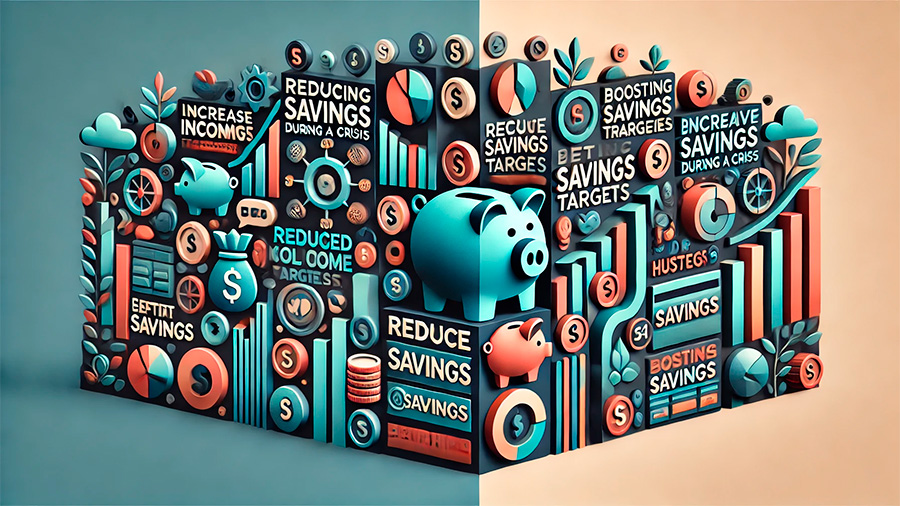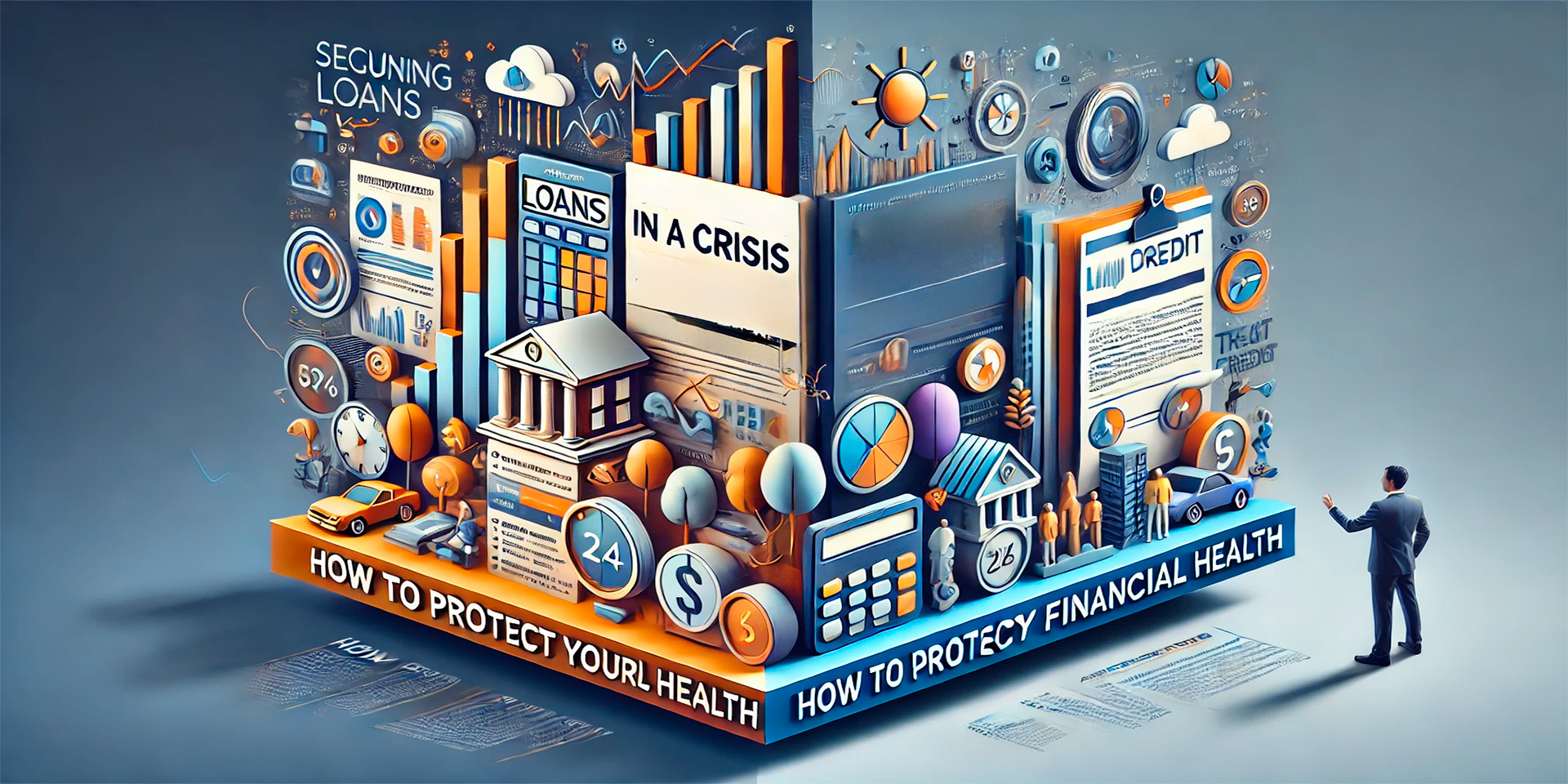Economic crises can put significant strain on personal finances, making it challenging to manage debt while also maintaining savings. During these times, it’s easy to feel overwhelmed by mounting bills and the uncertainty of future income. However, taking proactive steps to reduce debt and increase savings is essential for maintaining financial stability. This article explores effective strategies that can help you navigate tough economic periods by minimizing debt and building a safety net of savings.
Understanding the Impact of Economic Crises on Debt and Savings
During an economic downturn, many people experience job losses, wage reductions, or increased expenses, all of which can make it difficult to keep up with debt payments or save money. Without proper planning, debt can spiral out of control, and savings can quickly deplete. However, even in difficult times, there are ways to manage debt and gradually build savings to create a more secure financial future.
Debt Becomes Harder to Manage
One of the most immediate challenges during a crisis is managing debt. Whether it’s credit card debt, personal loans, or mortgages, making monthly payments becomes harder when income is uncertain or reduced. Interest rates on certain types of debt, like credit cards, can also increase, making it more expensive to carry balances over time.
When you’re unable to meet debt obligations, the consequences can include late fees, higher interest rates, and a damaged credit score, all of which make it harder to regain financial control.
Savings May Take a Hit
In times of financial strain, many people are forced to dip into their savings to cover basic expenses. While savings are designed to be a buffer in emergencies, continually relying on them without replenishment can leave you vulnerable in the long run. As the economic crisis persists, the need to rebuild those savings becomes even more critical for future financial security.
Strategies to Reduce Debt During a Crisis
Reducing debt is crucial during an economic downturn, as it helps lower monthly financial obligations and improves your overall financial health. Here are some actionable steps to help you manage and reduce debt during challenging times.
Create a Debt Repayment Plan
The first step to reducing debt is developing a clear repayment plan. Start by making a list of all your outstanding debts, including credit cards, loans, and any other obligations. Organize them by interest rate, with the highest interest debts at the top. This method, known as the avalanche method, allows you to tackle the most expensive debts first while continuing to make minimum payments on other accounts.
Alternatively, you can use the snowball method, which focuses on paying off smaller debts first to build momentum. Both methods are effective, but the avalanche method often saves more money in the long run by minimizing interest charges.
Negotiate With Creditors
During an economic crisis, many creditors are willing to work with borrowers to develop more manageable repayment plans. Contact your creditors to discuss your financial situation and ask if they can offer relief options such as lower interest rates, temporary payment deferrals, or an extended repayment period.
Some lenders may even offer hardship programs designed specifically for individuals facing financial difficulties during an economic downturn. Taking advantage of these programs can provide short-term relief and help you avoid falling further into debt.
Consolidate High-Interest Debt
If you have multiple high-interest debts, consolidating them into a single loan with a lower interest rate can simplify your finances and reduce your overall interest payments. Debt consolidation loans or balance transfer credit cards can be useful tools for this purpose. By consolidating debt, you reduce the number of payments you have to make each month and can often secure a lower interest rate, which makes paying down debt more efficient.
However, be cautious about taking on new loans during a crisis. Ensure that the terms of the consolidated loan are favorable and that you have a plan to pay it off.
Cut Back on Non-Essential Spending
Reducing unnecessary spending is one of the most immediate ways to free up money for debt repayment. Review your monthly expenses and identify areas where you can cut back. This may include dining out, subscription services, or entertainment expenses. Redirecting those funds toward debt can help you make faster progress and reduce your financial burden more quickly.
It’s also helpful to create a strict budget that prioritizes essential expenses like housing, utilities, and groceries, while minimizing non-essential costs.

Strategies to Increase Savings During a Crisis
Building or maintaining savings during an economic downturn can feel daunting, but there are practical steps you can take to ensure you’re prepared for future emergencies.
Start an Emergency Fund
An emergency fund is essential for financial stability, especially during uncertain times. Even if you can only save a small amount each month, building up an emergency fund can provide a crucial safety net in case of unexpected expenses or further economic challenges.
Aim to save enough to cover at least three to six months’ worth of essential living expenses. If this goal seems out of reach, start by saving whatever you can afford and gradually increase your contributions over time. Consider setting up automatic transfers to your savings account to make saving more consistent.
Reduce Fixed Expenses
Lowering your fixed monthly expenses is a key way to free up money for both savings and debt repayment. Review your budget to see if there are any recurring costs that can be reduced or eliminated. For example, you might be able to save money by negotiating a lower rate on your utility bills, downgrading your cable or internet service, or switching to a more affordable insurance plan.
Even small reductions in fixed expenses can add up over time, allowing you to direct more money toward your savings.
Find Ways to Generate Additional Income
While it may be challenging to find new income sources during an economic downturn, exploring additional ways to earn money can help boost your savings. Consider taking on a part-time job, freelance work, or side gig to generate extra income. Online platforms offer a range of opportunities, from freelance writing and design to remote customer service or tutoring.
Even if the additional income is modest, every bit helps when building an emergency fund or paying down debt.
Automate Your Savings
One of the most effective ways to increase savings is to automate the process. By setting up automatic transfers from your checking account to a savings account, you ensure that a portion of your income is saved before you have the chance to spend it. This “pay yourself first” approach makes saving easier and more consistent, even when times are tough.
If you’re worried about fluctuating income during a crisis, start with a small, manageable amount and increase your savings rate as your financial situation improves.

Maintaining a Balance Between Debt Reduction and Savings
While reducing debt is important during an economic crisis, it’s equally crucial to maintain a balance between debt repayment and saving for emergencies. Striking the right balance depends on your financial situation, but here are some guidelines to help you prioritize.
Focus on High-Interest Debt First
If you’re carrying high-interest debt, such as credit card balances, focus on paying that off first before prioritizing savings. High-interest debt can grow quickly and make it harder to achieve long-term financial stability. By paying off this debt, you reduce the amount of interest you’ll pay over time, freeing up more money for savings.
Once your high-interest debts are under control, you can focus more on building your emergency fund and long-term savings.
Build a Small Emergency Fund
While it’s important to pay down debt, having some level of savings is essential for handling unexpected expenses, such as car repairs or medical bills. Aim to build a small emergency fund of $500 to $1,000 to cover immediate needs. Once you’ve established this cushion, you can focus more aggressively on debt reduction.
Building a small emergency fund prevents you from having to rely on credit cards or loans in case of an unexpected expense, helping you avoid adding to your debt during a crisis.
Conclusion: Achieving Financial Stability in a Crisis
Economic crises present significant challenges, but by taking proactive steps to reduce debt and increase savings, you can improve your financial stability and prepare for future uncertainties. Creating a clear debt repayment plan, cutting unnecessary expenses, negotiating with creditors, and finding additional income sources are all effective ways to manage debt during tough times.
At the same time, building a small emergency fund, reducing fixed costs, and automating savings can help you increase your financial cushion and weather future storms. By striking a balance between debt reduction and savings, you can achieve greater financial resilience and protect your financial health during an economic crisis.




